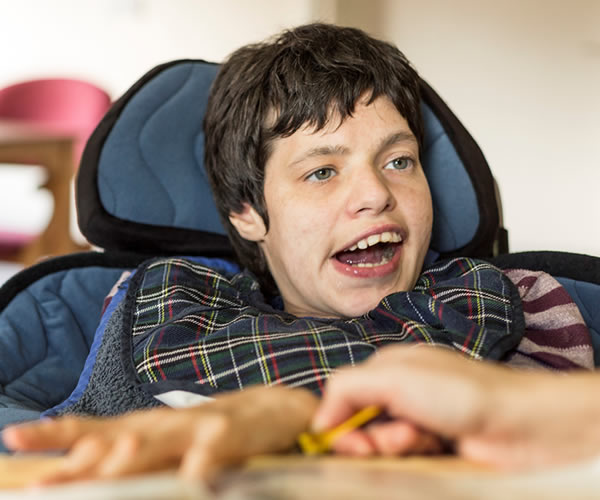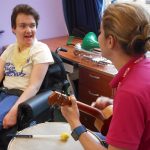Within This Issue
Welcome to the Summer 2017 edition of PMLD Link. In our call for contributions for this edition we expressed our hope that we could achieve a balance between illustrating the challenges and celebrating the joys of adult life – we hope that you will feel that we have achieved this! We have been delighted and overwhelmed with the number and range of articles submitted and offer thanks to all contributors.
We write this editorial in the aftermath of an election which has produced a hung Parliament, with Brexit negotiations about to start. Quite what the future will hold when it comes to health and social care for adults with PMLD, and others, is uncertain. As we hoped, we have been able to include several excellent articles on health and social care services for adults with PMLD in this issue, written by parent-experts (Jeanne Carlin, Sam Bergin-Goncalves, Mark Neary), social care providers (Michael Fullerton from CMG, Thomas Doukas from Choice Support, Salvador Tedd and Theo Bowstead from Lambeth and Southwark Mencap) and campaigners (Simon Duffy, Bella Travis and Eve Jackson from Mencap and others already mentioned who double up in this role!) These articles highlight the importance of health and social care services knowing who the adults with PMLD using their services are and what their needs and aspirations are. This point may seem obvious to PMLD Link readers but is in fact a crucial one in adult services where people with PMLD may be subsumed within categories such as ‘complex needs’. The articles emphasise the importance of personalised support and the need for structures which support families and providers to develop and sustain it. This means also having structures which support ongoing campaigning through local and national groups. We may know a fair amount about what works when it comes to supporting adults with PMLD to flourish, but we are still a long way from ensuring that this knowledge is put into practice everywhere. We would urge readers to heed the call made in this issue to get in touch with Mencap about their experiences, so that it can act on their concerns.
In this issue we also have a number of articles that deal with touch, particularly, to use Thomas Doukas and Leonie Elliott-Graves’ phrase ‘safe and positive touch’. We found it interesting that touch should emerge as a common theme within the articles and wondered why this was. Perhaps ‘touch’ serves as a locus of concern – or the locus of a particular concern: should I be trying to enter the world of the person with PMLD (which may be primarily a tactile one) or should I be working to bring them into the wider world (of people who do not have PMLD, where certain norms regarding touch prevail)? This stand-off between lifeworld and normalisation perspectives is perhaps an eternal one for supporters of people with PMLD but clear-thinking contributions such as Janet Gurney’s (in her viewpoint piece on using Intensive Interaction in public) and practical ones such as Becky Lyddon’s (on managing sensory processing difficulties in everyday life) can help us get beyond it and act. Reflection on our interactions with people with PMLD and others can also be helpful and Sue Hogan’s article explains a methodology for shared critical reflection among teachers which we think has applicability across sectors and settings.
The third and final theme of this issue is access to the arts. Practitioners at Access All Areas, Story Massage, Frozen Light, Folk Stories and the Touch Trust share a willingness to ‘break down the conventions’ (Culturised/Adams, 2017) of artistic spaces and constructs – theatre, dance, storytelling and musical performance – in order to allow people with PMLD access. What they find when they do this is not what some may have feared – that the construct has been lost – but rather than it has been invigorated. This is what everyone has to gain if we commit to a society that includes people with PMLD, and views them as contributors.
As ever, this issue also includes plenty of news items and details of relevant resources, as well as our short courses listing. You can also find useful information in past PMLD articles on adulthood, which Rob has identified for us; you can access these via our website.
Happy reading!
Rachel Parry Hughes, Becky Loney and Rob Ashdown




